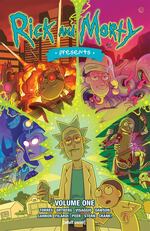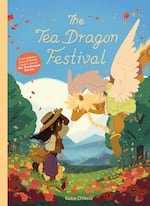Portland-based Oni Press, which makes indie comic titles such as the "Scott Pilgrim" series and "Rick & Morty," is joining forces with Lion Forge Comics, the St. Louis-based imprint specializing in a diverse line of "Comics for Everyone."

"Rick and Morty," based on the popular Cartoon Network Adult Swim series, is one of Oni Press' marquee titles.
Courtesy of Oni Press
Portland is home to at least a half-dozen smaller comics imprints. They face competition from giants such as Marvel and DC but also from book publishers, who are taking on more graphic novels every year.
"Much of the growth in recent years has been and continues to be and what we would call the book channel," said John Jackson Miller, who writes about the industry at Comichron.com, which just delivered its annual report on 2018 sales. "Places like Barnes & Noble and Amazon — places outside the regular periodical comic shop market."
Oni, around since 1997, is known as a publisher of graphic novels, mystery comics, romances — almost anything except superheroes. It brought Greg Rucka and Steve Lieber's breakthrough Eisner award-winning thriller "Whiteout" to life, as well as the "Scott Pilgrim" series that led to a cult-classic film adaptation.
One of Oni's most popular titles at the moment is the comic book adaptation of Cartoon Network's "Rick and Morty." Oni has experimented with developing its own content for film and TV, "Atomic Blonde," the Charlize Theron movie based on the Oni-published graphic novel "The Coldest City," by Anthony Johnson.
Oni's Jones says the merger is a move toward fortifying the company.
"For us, it was an opportunity to have some investment coming in," he said, "and being able to grow our operation, take more chances and do more of what we were already doing — just better."
Lion Forge was founded by David Steward II and Carl Reed, who came from a film background. They're also among the few black owners in the industry. Under the motto, "Comics for Everyone," they built out Lion Forge to include several imprints, publishing some branded series associated with pop culture icons such as "Knight Rider" and "The Care Bears." But the imprint is best known as a home for creator-owned work by people of color.
That's part of the reason the merger was met with such scrutiny among online fan communities. When staff at both institutions started losing jobs this week, the reaction was immediate.
Layoffs at Oni included publicity director Melissa Meszaros, warehouse assistant Scott Sharkey and the only black woman at the company, associate editor Desiree Wilson.

Katie O'Neill's "Tea Dragon Society" books have proved a solid hit for Oni's porfolio of titles for middle grade readers.
Courtesy of Oni Press
Lion Forge cut ties with editor-in-chief Andrea Colvin, associate editor Christina "Steenz" Stewart, editor Jasmine Amiri, senior editor Amanda Meadows and Kayla Tan, a production and logistics coordinator.
Oregon-based writer Gail Simone, an industry veteran, remains in place as creative director of Lion Forge’s Catalyst Prime — a series of superhero titles.
The gender and racial demographics of the fired staff were not lost on Twitter.
“This reads like white comfort is being given greater importance than healthy diversity or maintaining the clear African American influence and voice that ran all the way through Lion Forge.”
James Lucas Jones said he wouldn't comment on specific personnel matters but said any merger leads companies to look for redundancies.
"I'm not looking at this from a people perspective, but from a position perspective. None of the decisions were easy," he said. "Yesterday was not a fun day for any of us. We're so grateful to the folks who have worked with us, and it sucks."
Jones says pieces are still in motion but said he did not want to announce any new positions "until those people are on board." The need to maintain Lion Forge's commitments, he said, "is not a concern that we are insensitive to."
Another read of the Oni-Lion Forge alliance suggests an interest in new kinds of content creation. While Jones will oversee both Oni and Lion Forge, going forward the entire entity exists under the management of Polarity, the multimedia company Lion Forge quietly rolled out a year ago as a holding company and investment platform for animation and other pop culture content products. Oni's co-founder and president Joe Nozemack is stepping back into an advisory position.
Charlie Chu, Oni's co-founder and executive vice president of Creative and Business Development, says one of the things he's most proud of is the company's strong spirit of idiosyncrasy. He said, "We're trying to fundamentally not change the taste-making and creative decision-making that Oni has historically had."
Oni has made some forays into table-top game development. Lucas and Chu say the new entity will do some music development. Chu also says readers can definitely expect more forays into titles for young readers, in the tradition of Katie O' Neill's "Tea Dragon Society," published by Oni in 2017.
"The real explosive growth," Chu says, "is in book and library titles appealing to kids comics, and titles appealing to a more diverse readership and teen and YA [markets]."
In terms of what the merger tells about the comic book market, ComiChron's John Jackson Miller says it's a further flowering of the middle-tier market that barely existed in the mid-2000s.
"There are far comic books coming out than there were 10, 15, 20 years ago," Miller said.
For example, he says, the 300th best-selling comic book today is outselling the 300th best selling comic book from 20 years ago by a factor of three or four. But that growth, as with the general success of graphic novel comics sales, has a consequence.
"The audience is fragmenting across a wider and wider variety of choices," he said. "It does get to be difficult competing once we have so many comic books coming out."
With the real money being made by periodical titles that survive long enough to be collected as graphic novels, the players with the resources to stay in the game are the ones who might make it into the industry's next stage.
